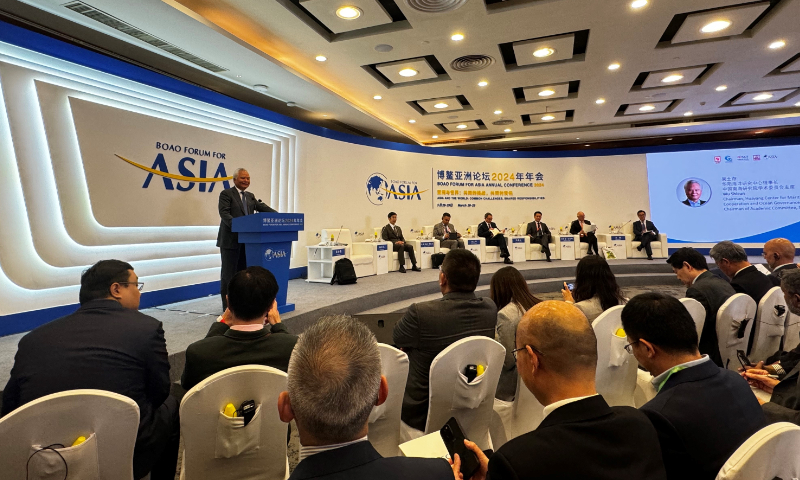Lose-lose situation due to miscalculation, misunderstanding should be avoided in S.China Sea: experts

A panel discussion on the South China Sea issue takes place during the Boao Forum for Asia Annual Conference 2024 in Boao, South China's Hainan Province, on March 28, 2024. Photo: Liu Caiyu/GT
As the tension between China and the Philippines in the South China Sea heightens and the overall situation in the region becomes more complicated, a panel of observers called for more concrete cooperation and effective management of conflict during a subforum on the issue at the Boao Forum for Asia Annual Conference 2024 on Thursday.
Experts and diplomats from China, Vietnam, the US and Indonesia had a heated discussion on how to safeguard peace and stability in the South China Sea, during a panel debate under the title of "Guided by Cooperation, Building a Community with a Shared Future in the South China Sea."
Deputy Director-General of the Department of Boundary and Ocean Affairs under the Ministry of Foreign Affairs Yang Renhuo said China has always believed that dialogue and cooperation are key to maintaining peace and stability in the South China Sea. The country consistently advocates for peaceful resolution of disputes through negotiation and consultation with directly involved parties, Yang noted.
Dino Patti Djalal, former deputy foreign minister of Indonesia, emphasized the importance of building mutual trust among regional countries in relation to the South China Sea.
The ability of China and ASEAN to manage the South China Sea disputes peacefully will be a powerful example to a troubled world that the relationship between the two sides is also a robust problem-solving partnership and that Asians have the craft, skill and political will to transform conflict into cooperation, Djalal noted.
In an interview with the Global Times following the discussion, Djalal expanded on his proposal by suggesting the establishment of a track-two dialogue or platform for all parties involved to discuss potential functional cooperation in less sensitive areas. In addition to marine research and development, he also highlighted biodiversity and climate change as potential areas for cooperation.
Vice President of the Diplomatic Academy of Vietnam Nguyen Hung Son told the Global Times that he has observed a growing risk of miscalculation and misunderstanding in the region, especially in a time of uncertainty and geopolitical competition.
The uncertainties in the South China Sea have grown rapidly in recent times. Manila's vessels have been conducting dangerous and provocative behavior in the region, which violates China's territorial sovereignty and maritime interests and leads to a higher risk of accidents and even conflict in the region.
"The outcome of such a scenario would be catastrophic, a lose-lose scenario where everyone competes for a bigger pie while the whole cake becomes smaller," Son said.
The overall situation in the South China Sea is still manageable, Wang Sheng, president of the National Institute for South China Sea Studies, told the Global Times. However, he worries that the current Philippine government's low political desire to meet China halfway over the South China Sea poses a big challenge to regional peace and stability.
"South China Sea countries have to work harder to reduce confusion, misunderstanding, and even miscalculation. And I think this is possible," Son told the Global Times.
Apart from the provocations from the Philippines, it can be observed that an increasing number of non-regional countries have interfered in the South China Sea issue, with the latest examples being South Korea and India. Security issues in the South China Sea are expected to top the agenda of the first trilateral leaders' summit between the US, Japan and the Philippines in April. The three countries carried out a joint exercise in August in the South China Sea region.
According to Wang, another threat is the interference of non-regional countries, including the US and Japan, in this issue. "The recent increase in their involvement in the South China Sea, including at the military level, has thickened the shadow of geopolitical rivalry in the region, and the agenda of regional cooperation has been disrupted or hindered in our South China Sea neighborhood," Wang noted.

